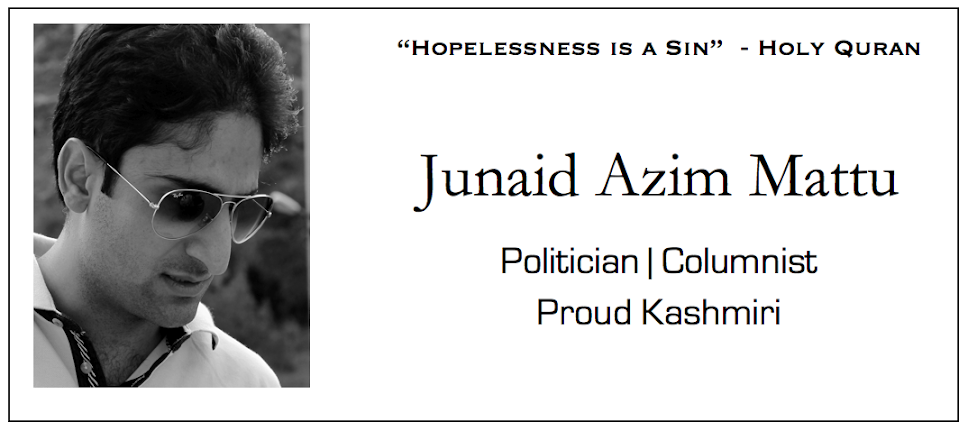In Response To PDP's Naeem Akhtar
Nayeem Sahab is a committed contrarian and a wise cynic.
His incessant ability to profess doom seems effortless if not organic. While his
post-retirement satire has entertained some and amused some, his enviable tendency
to hand out moral indictments is unsurpassed.
Nayeem Sahab has a right to criticize the National
Conference and glorify Mufti Sayeed as an angelic savior sent from above. He,
despite his age and stature, also has a right to hurl invectives, sexist
analogies and slurs in the guise of a rational debate – as despicable and
tragic as that might be.
However this obnoxious name-calling is also a tragic
demonstration of how PDP continues to be invested in the conventional realm of
venal, nasal and bitter politics – one that this generation has grown tired of.
These highly personal, crude tit-for-tats for demonstrating loyalty to the
party bosses is revolting and repulsive.
PDP’s image of a bitter, perpetually negative opposition
contradicts its claims of being a progressive alternative in our system. And I
say so as a young Kashmiri, not as a columnist and not as a politician.
But I also understand PDP’s need to distort history by
pretending that Mufti Sayeed was born in 1999 and is but an innocent 15 year
old who has no taints to hide, no baggage to carry. Unfortunately for PDP
though, Kashmiris do not suffer from a collective memory loss and their
consciousness about their history goes deeper beyond 1999 – when Mufti Sayeed
formed the PDP.
Even though Nayeem Sahab has stooped low in writing like
a self-indulgent nawaab with a long hookah hose in his hand who looks at
politics from the prisms of mujras and “orgies”, he (after getting this unfortunate
urge to demonstrate all of this out of his way) has also managed to put forth
some half-baked arguments and it is important to debate those.
I will not get into Nayeem Sahab’s convenient, retrospective analysis of
what Sheikh Sahib should have and shouldn’t have done in the 1950s or the 1970s
for the precise reason that unlike him I have realized that one cannot dissect
history and pass judgments on what was done and not done six decades ago and
then attach moral attributes to such decisions. That’s a luxury best left to
Nayeem Sahab. A fundamental problem with a retrospective analysis of history in
conflicts like those of Kashmir is that we don’t depict the past in objective,
historical contexts but instead view and judge history through either the
jaundiced lenses of ideology or through the prisms of contemporary ramifications.
However, I find Nayeem Sahab’s objection to Omar
Abdullah’s presence in Vajpayee’s cabinet ironic given how PDP has repeatedly
lauded Atal Bihari Vajpayee and his initiatives in Kashmir. The nature of the
conflict and the ramifications of the unresolved political sentiment here merit
that statesmen in Kashmir engage with Indian leaders who believe in redressing
the wrongs committed in Kashmir and are invested in reconciliation,
reconstruction and peace. NC did that with Vajpayee and Vajpayee’s initiatives
for Kashmir justified that cooperation.
PDP cannot justify its infatuation with Narendra Modi by
pointing at NC’s alliance with Vajpayee’s NDA. It can try doing so but Mehbooba
Mufti’s frequent outbursts of admiration for Modi will make this defense a
tough task. She will continue praising Modi even if Nayeem Sahab continues to
trivialize this issue. Also stating that Modi is a Vajpayee reincarnate and
hence PDP is justified in cozying up to him is a tough task – even for Nayeem
Sahab.
Mufti Sayeed’s role in Kashmir’s contemporary political
history needs to be studied more elaborately in view of PDP’s efforts to
distort history. When Nayeem Sahab speaks of power coming from Delhi and not
from the people of this State, he conveniently forgets to mention that Mufti
Sayeed journeyed to Kashmir from New Delhi as its chosen one and not the other
way round. The former Home Minister and former Tourism Minister of India had
virtually no political presence in Kashmir when he was crowned in Delhi.
Nayeem Sahab speaks of POTA while forgetting to mention
Mufti Sayeed’s role in implementing AFSPA in J&K, in overseeing a
collective assault on Kashmiris through Jagmohan – in being the architect of
‘Operation Tiger’ and ‘Operation Catch-and-Kill’ and in being one of the most
ardent integrationists in J&K’s history – in secretly harboring an
ideological opposition to Article 370. He doesn’t mention Mufti’s role in
intriguing against and dismissing democratically elected governments in the
State – in Mufti’s invariable complicity in everything that is twisted in our
contemporary political history. In how ruthlessly Mufti dealt with militancy in
J&K and pledged to crush it by hook or by crook.
As for the matter of J&K’s economic self-reliance and
the achievements or lack thereof of successive governments in harnessing our
power potential – I in my humble, non-satirical capacity invite Nayeem Sahab to
a public debate in this very newspaper. However, that debate would also raise
questions about Mufti Sayeed’s spectacular refusal to help this State when he
could have as a part of the Union Cabinet and also PDP’s consipcous silence on
the return of power projects from 2002 to 2008.
Nayeem Sahab, in closing his Nawaabi harangue defined by
his analogies of “orgies” and “mujras” has also alleged “NC has employed a number of officially and unofficially
paid apologists to hit at PDP for links with Modi”. This perhaps might be an
obtuse reference to me and a colleague of mine in view of our columns on this
issue. Yet another unfortunate fall from grace for Nayeem Sahab. As far as
PDP’s links with Modi are concerned - there is little need for any efforts from
our side to highlight this blossoming affair as long as Mehbooba Ji goes around
town being a Modi cheerleader.
(Junaid Azim Mattu belongs to National Conference. Views are
personal. Email at junaid.msu@gmail.com)



